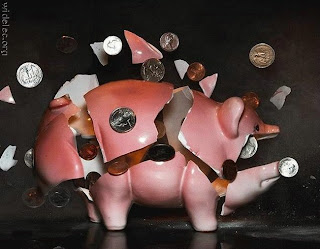
The
Dragons looked stunned when Paul with the plastic doo-hickey that
rolls up the rim of a paper cup said he had sold 200,000 of the things and had made $100,000. With the detailed description of sales achieved, energy swept through the Dragons and they each piled in with their ideas about the potential market. It was exactly what Paul said he wanted – a brain storm with smart entrepreneurs- although he did also let slip that his friends tell him, "You're crazy!"
Kevin O'Leary agreed, "You're crazy but you're crazy like a fox." Glad Kevin's a Simpsons fan but when asking for investment money, save your psychological confessions for when you've made the front cover of Profit because that streak of eccentricity could make your potential investors a tad nervous. Even the kindly Robert Herjovec said, "Paul, it's over."
Moving on to the ideas that amuse us armchair Dragons, there was one gentleman anxious for Canadians to make his
symbolic head gear as instantly recognizable as the sombrero. Guess he's not heard about the Mounties' hat made famous by Dudley Do-Right, or Paul Gross in Due South and he must have missed that law suit where the Mountie preferred to wear his turban. We got a sense that Brett Wilson, the new Dragon, like Clint Eastwood, would have liked the idea if it had involved a big cowboy hat with a black cigar thrown in for free. Now you're talking. Someone said that Clint Eastwood has two expressions – the one with his hat on and the one without the hat. Likewise, Brett has two expressions: one when he wears the next Canadian headgear – the "duck foot" hat - and one when he doesn't.
Then the ladies from No Smudge
Lipstixx were a little alarmed to learn from Kevin that they were in the most competitive industry from hell and that their competitors would blow their cars up in their driveway. Yikes! Kevin's comments reminded me of when I was at university, we had a Friday night party where we watched Charles Bronson movies and every time Charles killed someone, we all had to take a drink. I think Dragons' Den could package a game where every time Kevin says "you're crazy" you take one swig of beer and "you're an idiot", a shooter of tequila and when he makes someone cry, you get to wear the "duck foot" hat.
When a
teacher with language software arrived, Kevin groaned, "Please tell me you have some sales." Yeah – half a million dollars worth sold from the basement of Catherine's home. Kevin and Robert Herjavec agreed that it is unique for early stage software to have such a good level of sales.
I'm a huge fan of Kevin and the sheer exuberance he brings to Dragons' Den. Someone has whispered in his ear that he's not always super nice but as he says, life is tough. Kevin says it aloud and when people let their stress rise, they miss what Kevin is needing from them. When pitching, expect your heart to pound and give yourself something to calm down. Hold your lucky rabbit's foot or breathe slowly.
I would prefer to deal with someone like Kevin who lays his cards out and gives the entrepreneurs clues to what he needs to hear. He told Catherine he cares about the children which got guffaws from Robert, but if Catherine had been paying attention, she should have jumped in with statistics about the children using her software. Instead, she didn't give even a smidgeon of numbers. She left Kevin remembering his purgatory of life in educational software and swigging back what looked suspiciously like scotch, from his water glass.
Jim Treliving piped up that anything Kevin O'Leary likes, he's interested in coming for the ride too. Poor Kevin has to piggyback the other Dragons and they are making his deals more competitive by bidding up his offers. With the dramatics over, Arlene snapped up that deal at half the value and Big Jim did not join her. Unlike Kevin, Arlene walks softly but carries a big stick. Did the Dragons know that she made her original money by investing in educational software? Catherine, did you hear Kevin say Arlene's ripping you off by stealing half your company?
At this point, my son flipped his laptop over to me to show Catherine's software. He's just started Spanish this term but can already say a few phrases, seems to be handling the vocabulary and is actually enjoying it. As an anxious parent, I have wondered how he has managed to survive. Turns out the teacher gets them to do mini tests on the software as a treat which means my son has already done many quick quizzes to test his Spanish. Compare that to the two tests he may have done with a traditional classroom teaching method. That's hot – which brings us to the end of the show – the mini street Cirque De Soleil called Aerial Angels-
two dynamic women with a sizzling street act.
Again, Kevin told the street acrobat, Alison, she was arrogant, did not listen and forget about the crying crap because business is no place for tears. Robert as usual, saved the day advising Alison to decide if she was an artist or a business owner – the same business attitude blocking Catherine from earning the profits she deserves.
Suddenly, from the shadows Brett spoke up, "Alison, I love your passion. I'm in."
The other Dragons looked at Brett as if he had confessed to being scammed by a Nigerian email.
Dear Brett,I am writing to you with a matter of great urgency. My beautiful acrobatic auntie has expired and I need to send her bank balance to an Albertan account. Please show your compassion and tell me the details of your bank account. We are absolutely keen to meet you too, but you can send a blank cheque as well, if you prefer.
Had Brett taken to heart Big Jim's earlier advice to the "roll up the rim" fellow to get a good lookin' gal and sales would soar? I'm with you on that Jim, and Richard Branson of Virgin definitely buys the Treliving marketing theory: There's no doubt that in the right situation, looks do sell. But perhaps Arlene laughed wryly because these are exactly the reasons that women think men in business can be manipulated – how smart is it to make decisions using your libido?
After this show, Brett will be smiling as he specializes in entertainment and knows how to make money with these talented artists and Arlene got a slam dunk with her software deal. Albertans are a mysterious, quiet bunch but they're the ones in Canada with the growth economy, making the money.
 “Indecision and silence is the most dangerous risk a business owner could take”, says Charles Loewen, CEO and President of a fourth generation family business. Loewen Windows is a company where seeming opposites exist in harmony; delicate beauty and a steely toughness; pride in craft tempered by an abiding humility. This family business has remained faithful to its roots, but has also grown to embrace new technologies and ideas from places as diverse as Europe, Japan, and North America.
“Indecision and silence is the most dangerous risk a business owner could take”, says Charles Loewen, CEO and President of a fourth generation family business. Loewen Windows is a company where seeming opposites exist in harmony; delicate beauty and a steely toughness; pride in craft tempered by an abiding humility. This family business has remained faithful to its roots, but has also grown to embrace new technologies and ideas from places as diverse as Europe, Japan, and North America.




















